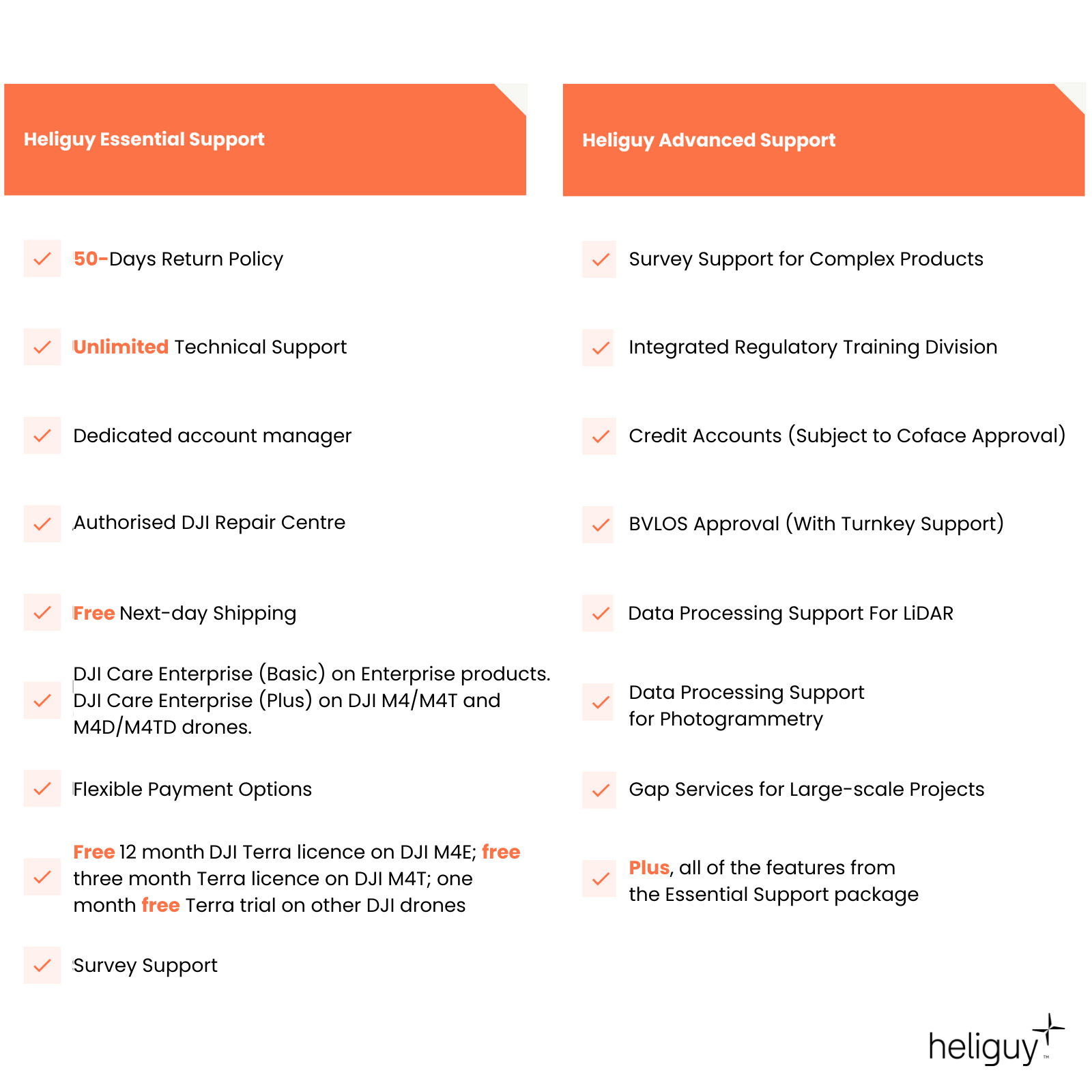DJI Dock 2 (Dock Only)
DJI Dock 2 is a compact, all-weather drone-in-a-box solution designed for remote and automated deployments.
Mission Versatility Deploy DJI Dock 2 with DJI M3D for precision surveying and inspection, or combine with DJI M3TD for visual and thermal data collection.
About This Package Only includes Dock 2. It does not come with the DJI M3D or M3TD drone.
DJI Dock 2 Partner Leverage our support for site planning/installations; repairs with Dock technicians; SLAs; in-house survey assistance; and UK SORA (formerly OSC) consultancy for BVLOS operations.
- Overview
- Contents
- Specifications
- Support
- FAQ
- Heliguy Services
DJI Dock 2
Compatible Drones
Pair the DJI Dock 2 with the DJI M3D or DJI M3TD.
Matrice 3D: Integrated wide-angle camera and tele camera. Suitable for mapping.
Matrice 3TD: Integrated wide-angle camera, tele camera, and infrared camera. Suitable for security and inspection.
IP54 dust and water-resistant.
50 minutes maximum flight time and 10km operating radius.
Six-directional obstacle sensing.
400 battery cycles.
RTK centimetre-level positioning.
DJI Dock 2
Easy Deployment In Any Weather
Lightweight: DJI Dock 2 weighs 35kg and can transported by two people, enabling flexible installation and reducing installation costs.
Efficient Site Evaluation: Before deployment, the aircraft can detect the surrounding environment using vision sensors and determine whether there are strong GNSS signals in the area. This helps to accelerate site selection.
IP55 Rating: The Dock 2's IP55 dust and water resistance rating ensures it operates for extended periods of time, even in harsh climates and environments.
Environmental Monitoring: Integrated sensors, including rainfall, wind speed, and temperature gauges, perceive real-time weather changes. Using DJI FlightHub 2, you can receive timely warnings or terminate flight tasks.
Improved Landing Stability: Using next-gen image recognition technology, the aircraft identifies positioning markers on the Dock's landing pad. The Dock's new slide-ramp centring design further supports precise landing.
Built-in Backup Battery: The built-in battery enables the Dock 2 to operate independently for more than five hours, with sufficient time for the drone to return and land.
Six-Month Maintenance Interval: DJI Dock 2 only requires maintenance approximately every six months.
Abnormal Condition Notifications: Receive email notifications from DJI FlightHub 2 if the DJI Dock 2 and the aircraft encounter task failures or emergencies.

DJI Dock 2
Round-The-Clock Operations
Quick Take-off: DJI Dock 2 features dual RTK antennas, allowing the aircraft to obtain accurate RTH location information without needing an RTK fix.
Rapid Charging After the aircraft lands at the base, the Dock 2 can charge the drone from 20% to 90% in 32 minutes. This is perfect for continuous operations and ensuring the drone is ready for missions on demand.
Dual-Camera Monitoring: You can remotely do DJI Dock 2, which features an internal and external fisheye camera for real-time displays. Remotely observe weather conditions, environmental circumstances, and the air take-off takeoff and landing. DJI Dock 2 features an internal and external fisheye camera for real-time displays.
DJI FlightHub 2
Cloud-Based Operation
Cloud Mapping: After the drone's mission, DJI FlightHub 2 generates a high-precision 3D model based on the flight data. Models can be annotated, measured, and downloaded.
Flight Route Editor: Use 3D models for visual flight route editing and preview simulated imaging results.
AI Spot-check: Frame a specific area in the 3D model, and the drone will compare the area to be captured with the framed area in subsequent automated operations. This ensures repeatable data across multiple flights.
FlyTo Tasks: Use 3D models to automatically plan optimal flight routes. Click on the subject, and the aircraft will fly to the destination.
Live Flight Controls: Control the drone and gimbal remotely from a remote location with FlightHub 2 or third-party software.
Model Comparison: Compare side-by-side models to track project progress over time.
Obstacle Bypass: During automatic flights, the drone uses its omnidirectional sensing and automatic bypass functions to enhance flight tasks.
DJI Dock 2
Open Ecosystem
Private Deployment With Cloud API: Tailor a customised management system for DJI Dock 2 with Cloud API or quickly connect it to a third-party cloud platform, such as FlytBase or Drone Harmony, to facilitate efficient and convenient private deployment.
Third-party Payloads: Connect third-party payloads to the drone and control them via cloud-based software. The drone can also integrate with a parachute (available separately).
Edge Computing: DJI Dock 2 has an edge computing expansion interface that enables the pre-processing of media files and more to improve operational efficiency further.
Cloud-to-Cloud Coordination: DJI FlightHub 2's FlightHub Sync function allows users to easily link the device to a third-party cloud platform for flexible operation data management.
DJI TerraAPI: Integrate the powerful mapping capabilities of DJI Terra into your dock management systems. This enables automated 2D/3D reconstruction and customised photo mapping workflows.
DJI Dock 2
DJI Dock 2 Vs DJI Dock
DJI Dock 2 has some key upgrades compared to the original DJI Dock.
Smaller Footprint: Dock 2 weighs 34kg compared to DJI Dock's 105kg. This makes Dock 2 easier to transport and better suited for roof deployments.
Longer Flight Time/Greater Range: The M3D/M3TD can fly for 50 minutes and has an operation radius of 10km, while the M30 Series for DJI Dock fly for 40 minutes and a 7km operating radius. This is a 25% improvement in flight time and a 43% improvement in the operating radius
More Capability: With the DJI M3D, DJI Dock 2 provides an advanced high-precision mapping solution. DJI Dock is mainly deployed for security patrol and inspection.
Smarter Functions: DJI M3D drones automatically bypass obstacles during flight. M30 drones for DJI Dock can only hover or return to start when obstacles are encountered.
More Reliable: DJI Dock 2 features a slide-ramp centring design and wireless charging. Dock 1 has push-rod centering and contact charging. DJI Dock 2 is easier to maintain.
Faster Takeoff: DJI Dock 2 can take off without waiting for an RTK fix, while DJI Dock 1 must wait for RTK to be fixed.
Precise Landing: DJI Dock 2 has next-gen image recognition technology for a more precise landing. DJI Dock mainly relies on RTK for landing.
Accreditation
![UK CAA Recognised Assessment Entity (RAE)]()
UK CAA Recognised Assessment Entity (RAE)
Authorised GVC/A2 CofC Training Courses
![UK CAA Permission for BVLOS Flights: Operational Authorisation UAS 15435]()
UK CAA Permission for BVLOS Flights: Operational Authorisation UAS 15435
Helping companies unlock BVLOS missions in an AAE with DJI Docks
![The UK's only DJI Gold and S-Level Partner]()
The UK's only DJI Gold and S-Level Partner
Trusted supply on DJI products
![ISO 9001 Certification]()
ISO 9001 Certification
Driving industry standards through robust operational protocols for enhanced safety and reliability
![Training Qualifications UK]()
Training Qualifications UK
Accredited training courses endorsed by TQUK.
![Ofqual-regulated Training]()
Ofqual-regulated Training
Recognised quality mark for meeting accreditation criteria.
![Cyber Essentials]()
Cyber Essentials
Verified data security
![Financial Conduct Authority]()
Financial Conduct Authority
Authorised to conduct regulated financial services
![Armed Forces Covenant Defence Employer Recognition Scheme - Silver Award]()
Armed Forces Covenant Defence Employer Recognition Scheme - Silver Award
Proud supporter of our Armed Forces
![D-U-N-S Registered: 77-916-1210]()
D-U-N-S Registered: 77-916-1210
Verified to conduct international business









